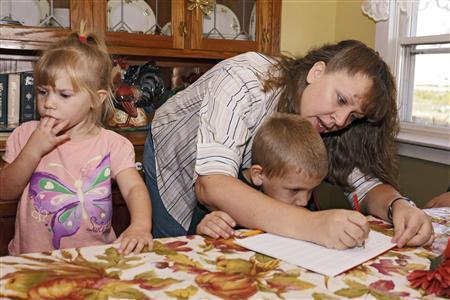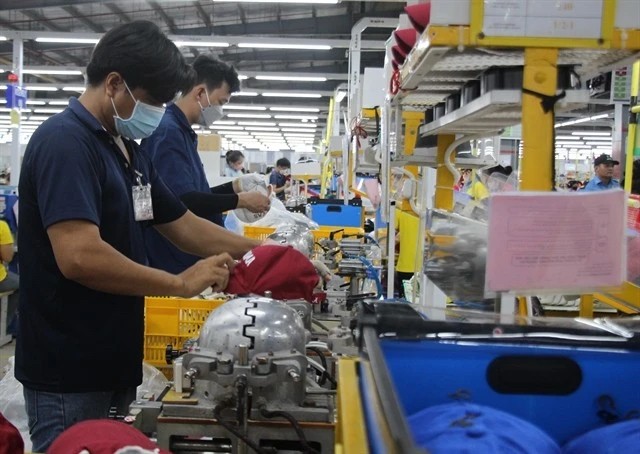Homeschooling is not a quit to traditional education, expert
According to Dao Thu Hien (Harvard University master), the homeschooling model - home-based education is not simply a parent's "quit" solution to the injustices that they encounter with in public schools.

Homeschooling (Source: Reuters)
Recent news that a family in Ho Chi Minh City choosing to teach their children at home instead of sending them to school may have prompted many parents and educators in Vietnam to fret. When I read reactions on social networks, I found that the majority of people were protesting, arguing that this was a "quit" solution, and depriving these kids of a chance to face everyday challenges they need.
This controversy, in my view, is necessary in the current context of Vietnam, where there are still many inadequacies in public schools, unapproved homeschooling as well as a lack of social systems to support self-teaching.
In many parts of the world like Australia, USA, UK and Canada, homeschooling is not new. The best example is probably the United States, where this model has emerged since the 1960s and now has up to 2 million children studying at home, accounting for about 3-4% of school age children. Since 1989, states have officially recognized "home schooling" by removing compulsory school attendance, accepting academic results of home schooling, and allowing schools to award graduate degrees for students who meet the requirements.
In parallel with that, the state aslo introduced a quality management process. Many organizations were set up to support parents, provide curriculum and teaching methods.
In Canada, approximately 22,000 students study at home. A survey conducted by the Canadian Center for Home Education in 2006 on 5,800 cases across the country found that 94% of these students achieved academic results better than their peers at public schools, both in knowledge and capacity.
However, homeschooling pioneers on early days in those countries also could not predict how their children would develop. They just relied on a personal belief and motivation such as: no faith in schools (schools kill creativity); children learn best when taught in a suitable way (specialized education vs one size fits all) or circumstances do not allow children to go to school (live in a remote area...).
Thanks to persevering advocates of homeschooling and open-minded policymakers, homeschooling has been explored and built. Like other new ideas, homeschooling had to go through the process of "start-up" to become an investment option and receive social support. To date, parents in the United States choose homeschooling not because they "give up" but simply choose a more effective way for their children.
Not the appropriate choice for all ...
Although homeschooling is the choice of millions of families around the world, it does not mean homeschooling is the right choice for all families. In addition, each society may have certain common views about what our children need to be taught.
Take Germany for example. This country has a very advanced education system, but it still prohibits homeschooling with the reason that parents can spread their (religious or political) ideologies inconsistent with the background of national education.
We should learn about the advantages and limitations of this model to get the best view. Based on studies in countries and circumstances in Vietnam, I find the following points that parents should consider:
Advantages of homeschooling :
- Learning at home is more comfortable than at school, not traveling, not getting hot or tired.
- Each child has his or her own learning style and needs, so they can find the right pace for their studies at home.
- Learn what you want, do not have to follow the general program as long as you meet the requirements at the end of the course. In Vietnam there are no regulations for homeschooling so this model is only suitable for examinations of foreign programs.
- 1 teacher / student (or parents directly teach children) should save time.
- Reduced risk of bullying, accidents, or pressure from friends and teachers.
- Reduce the risk of being influenced by the ideology of the majority.
Disadvantages of homeschooling:
- In Vietnam, the biggest disadvantage is that home education is not acceptable so you will not graduate and not go to higher levels. Study abroad is the only option (also a good choice but it requires financial capacity and is well prepared in terms of foreign language, academic strength and personal development).
- Reduce opportunity to develop skills in building relationships in the social environment.
- Reduce the opportunity to learn from many people, many styles, develop not only knowledge but the way to look at the problem and increase the inspiration.
- There may be limited access to collective, extra-curricular activities such as soccer fields, theaters, etc.
- Parents need time to teach children and must have pedagogical skills as well as background knowledge.
- Parents need to be inspirational and positive motivation for children (not everyone is persistent enough).
- If parents have outrageous views, they can influence one way to children.
 |
The author of the article Dao Thu Hien
| Dao Thu Hien studied Master at Harvard University from 2003 to 2005 and studied at Columbia University from 1997 to 1998. She previously worked at the New York Department of Finance and the New York Mayor's Office for the period 2005 - 2011. Previously Dao Thu Hien is a reporter for Bloomberg and AP. Ms. Hien used to work as a counselor for the US Department of Education on educational reform for 2010-2012. |
Translated by Tran Ngoc
Recommended
 National
National
Vietnam News Today (Jun. 7): Prime Minister works with Estonian firms to accelerate projects in Vietnam
 National
National
Vietnam News Today (Jun. 6): Foreign Investment in Vietnam Surges in Five Months
 National
National
Vietnam News Today (Jun. 5): PM sets off for attendance at UNOC 3 in France, official visits to Estonia, Sweden
 National
National
Vietnam News Today (Jun. 4): Vietnam - Promising Candidate for Southeast Asia’s Next Powerhouse
Popular article
 National
National
Shangri-La Dialogue 22: Vietnam Highlights Some Issues of Ensuring Stability in a Competitive World
 National
National
Vietnam News Today (Jun. 3): PM Pham Minh Chinh to Attend UN Ocean Conference, Visit Estonia, Sweden
 National
National
Vietnam News Today (Jun. 2): Vietnamese Trade Mission Sounds Out Business Opportunities in United States
 National
National



